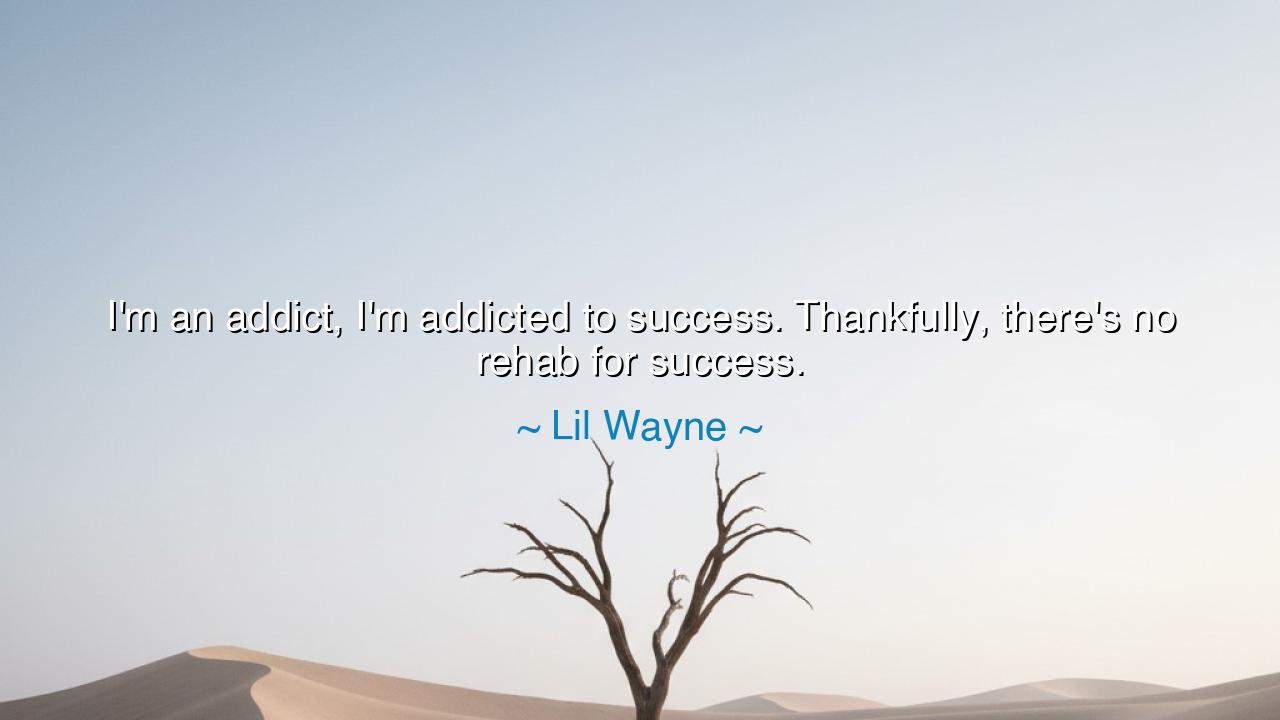
I'm an addict, I'm addicted to success. Thankfully, there's no






“I’m an addict, I’m addicted to success. Thankfully, there’s no rehab for success.” Thus spoke Lil Wayne, the tireless poet of hip-hop, whose life became a testimony to relentless drive. His words are clothed in jest, yet within them lies a profound truth: that success, once tasted, becomes not merely an achievement but a hunger, a fire that cannot be extinguished. He likens it to an addiction, not of destruction, but of creation—a compulsion to rise higher, to conquer more, to refuse the chains of mediocrity.
The ancients too knew this flame. Alexander the Great, when told there were no more worlds to conquer, wept not for lack of triumph, but for lack of challenge. Julius Caesar, upon seeing the statue of Alexander, lamented that at his own age he had achieved so little. Such men were not satisfied with a single victory—they were addicted to success, compelled to chase it until their dying breath. What Lil Wayne names in modern words is the same immortal fire that has burned in conquerors, artists, and dreamers across all ages.
To be “addicted to success” is to refuse stagnation. It is to see each victory not as an ending, but as a stepping stone to the next horizon. For Wayne, this addiction was born from a youth spent in hardship, where success was not a luxury but a necessity. Rising from the streets of New Orleans to global fame, he understood that once the heart has discovered the power of triumph, it cannot go back to silence, it cannot live without the taste of achievement. In this way, his addiction is less a vice and more a vow: to never stop striving, to never grow complacent.
History gives us many echoes of this relentless spirit. Think of Thomas Edison, who after thousands of failures did not rest when he finally discovered the light bulb. Instead, he moved on to new inventions, never ceasing to create. Or consider Serena Williams, who, after championship upon championship, still trained with hunger as though she had yet to win a single match. For those who live by this fire, success is not a final destination, but an endless road, and their addiction drives them further than ordinary strength could ever carry.
The lesson is both powerful and perilous. To hunger for success is noble when it builds, inspires, and uplifts, but dangerous if it consumes and destroys. Unlike other addictions, there is “no rehab for success,” as Wayne declares. The fire cannot be undone. It must be directed wisely, lest it burn the bearer. Thus the challenge is not whether one will pursue success—it is inevitable—but how one will shape it. Will it become pride and greed, or will it become mastery, legacy, and inspiration for generations?
O children of tomorrow, hear this teaching: let success be your fire, but not your prison. Seek it not only for yourself, but for the good you can bring to others. Allow it to sharpen your will, to lift you from despair, to carry you beyond what the world thought possible. But do not let it blind you or make you forget the purpose of your striving. For success, rightly pursued, is not only for the self—it is for the light it brings into the world.
In practice, let this mean setting goals beyond wealth and titles. Strive for excellence in your craft, discipline in your work, integrity in your life. When one goal is achieved, let it feed the fire for the next, not in vanity, but in vision. Surround yourself with others who are also addicted to growth, and together turn the hunger for success into a force of creation, not destruction.
Thus Lil Wayne’s words endure as both declaration and warning: to be addicted to success is to embrace a fire that never dies. May you carry that fire not as a curse, but as a blessing, and let it drive you to create a legacy that no passage of time can erase.






AAdministratorAdministrator
Welcome, honored guests. Please leave a comment, we will respond soon